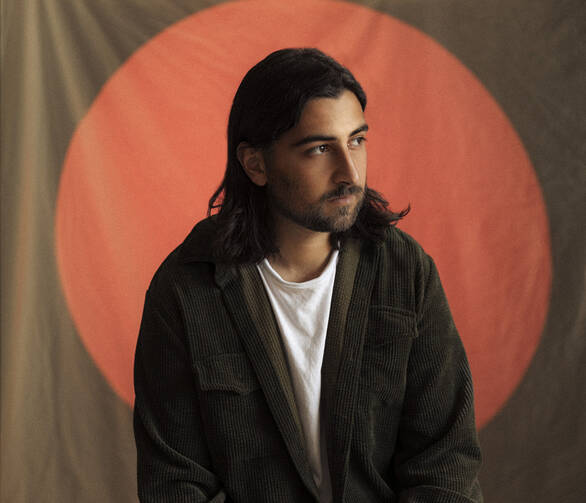With his earth-toned flannels, scruffy hair and beard, and mournful brown eyes, the 26-year-old singer-songwriter Noah Kahan looks a bit like someone outfitted Jesus in Woody Guthrie’s clothing. When the first E-flat chord strikes in his melancholy single “Northern Attitude,” the opening track of his most recent “deluxe” album “Stick Season (We’ll All Be Here Forever),” the influence of Guthrie and folk music is obvious in the intense twang of the guitar. The crisp sound that pours forth also bears a 21st-century exuberance that seems unique to Kahan and his cross-genre appeal.
After a few lines of repetitive chords, Kahan greets the listeners of his most popular studio album to date by softly uttering the lyric “Breathin’ in, Breathin’ out,” a meditative introduction fitting for a composition that simultaneously reveals so much vulnerability in its artist and prompts so much introspection from its listeners. Throughout the 83 minutes of music that follow, Kahan uses personal reflections on his relationships, his hometown and his coming-of-age experience to delve deep into the broody, moody waters of young adulthood in the American Northeast.
The imagery is so vivid that fans can take the emotion generated by Kahan’s music and swap in their own memories and mistakes.
Born in Strafford, Vt., Noah Kahan began songwriting at just 8 years old, citing the music of his childhood, including Counting Crows, The Avett Brothers, Paul Simon and Cat Stevens as his main influences. He signed a deal with Republic Records in 2016 at the age of 19, choosing a music career over college. While he initially released two pop-based albums, “Busyhead” in 2016 and “I Was / I Am” in 2019, it was his transition toward folk-inspired music with the October 2022 album “Stick Season” that ignited his career. A key to his enhanced appeal was probably the intensified vulnerability of the album that came from the isolation of the Covid-19 lockdown and his subsequent move from New York City back to his home state of Vermont.
Just over seven months after he released “Stick Season,” Kahan revealed an extended version of the album, entitled “Stick Season (We’ll All Be Here Forever)”on June 9, choosing to share seven new songs on top of an original 14. Since then, social media platforms like Tiktok have been brimming with videos featuring the catchiest excerpts from his newest hits—most notably, the chorus of viral song “Dial Drunk,” which debuted at number three on the U.S. Spotify charts. The single immerses fans into the despondency of a young man under the influence of alcohol as he confronts both his emotional turmoil and the local police. In the refrain, Kahan repeatedly laments:
I ain’t proud of all the punches that I’ve thrown
In the name of someone I no longer know
For the shame of being young, drunk, and alone
He is unable to embrace his adulthood because he is still mourning the passing of his adolescence.
Most of the internet videos featuring this chorus follow a simple formula: A teenager or young adult is situated in mundane surroundings—a car, a school bathroom, a kitchen table—enthusiastically mouthing Kahan’s lyrics, earnestly expressive and often even in tears. These disconcerting performances are often accompanied by a sentence or two written on the screen telling in detail a personal story of hitting a rock-bottom-low, recklessly abusing substances or, most commonly, losing a once-valued friendship or relationship.
In one video a young woman wearing yellow overalls points her finger at the camera, positioned over the words like a subtitle on her screen: “POV: you’re singing this but thinking of your old best friend that you no longer talk to.” Another shows a 21-year-old woman adorned in black and white plaid accompanied by a caption that reads: “This song is for the girlies who will spend the rest of their life atoning for how they acted at their lowest.”
Kahan uses the term 'homesick' to describe how he is sick of his home.
Kahan’s appeal seems to stem from the specificity of his lyricism; listeners don’t need to have confessed their intoxication to a police officer to understand the desperation or loneliness of that moment. The imagery is so vivid and therefore so evocative that fans can take the emotion generated by Kahan’s scenario and swap in their own memories and mistakes.
With a devoted fan base that is disproportionately young and profoundly emotional, Kahan’s popularity in the broader music scene remains recent and relatively niche. On Spotify, Kahan regularly amasses somewhere just above 10 million monthly listeners (and consistently rising). While he is far from the stratosphere of radio-hit A-listers like Taylor Swift or Ed Sheeran (who usually total some 90 million monthly listeners on Spotify), Kahan achieves a digital stream count comparable to enduringly popular indie artists from the 1990s and early 2000s, like Sufjan Stevens or The Smiths. He is right up to the brink of the mainstream level with plenty of room to keep growing.
I surrendered completely to the raw and targeted honesty of Kahan’s songwriting after a single listen.
Kahan’s fame is currently hitting a new peak, with “Stick Season (We’ll All Be Here Forever)” spending the third week of June at an impressive number three on the Billboard 200 charts. (“Billboard” measures album success by taking into account digital and physical sales as well as personal and radio streams.) This positive acclaim is coinciding with the first month of Kahan’s most recent international tour, which kicked off the last week of May and will include iconic venues like Red Rocks Amphitheatre in Colorado and Radio City Music Hall. Fans are paying up to $2,000 to see him live.
I have been a casual fan of Kahan since the release of the original version of “Stick Season”in autumn 2022. Like so many others, I surrendered completely to the raw and targeted honesty of Kahan’s songwriting after a single listen. Among the most notable of the original singles was the title track, in which Kahan confesses:
And I love Vermont, but it’s the season of the sticks and I
Saw your mom she forgot that I existed and
It’s half my fault, but I just like to play the victim
I’ll drink alcohol ’til my friends come home for Christmas
His influence comes from his acceptance and exploration of his own imperfection.
“Stick Season” is a specific moment in the year that falls somewhere between the peak of autumn and the heart of winter. In an interview with the music journal Genius, Kahan explained, “It was a term that was used by some of the older folks in the town I grew up in to describe this really miserable time of year when it’s just kind of gray and cold, and there’s no snow yet and the beauty of the foliage is done.”
The emphasis on a moment of seasonal transition—especially one characterized by a barren idleness—captures the essence of the role Kahan embodies throughout the album. He is a young person unable to embrace his adulthood meaningfully because he is still mourning the passing of his adolescence. With the melancholic power of an acoustic guitar as his guide, Kahan uses “Stick Season” to grieve the past openly and thus take the first step toward finding potential in the future.
'You’re Gonna Go Far,' explores the guilt and anxiety that often accompany the decision to actually live freely and fully.
Kahan repeatedly works with the idea of leaving home as representative of a broader transition into independence and adulthood. This appears most explicitly in my favorite of Kahan’s hits, “Homesick,” in which the singer addresses his dissatisfaction with his home in tandem with his perceived lack of motivation to leave:
I would leave if only I could find a reason
I’m mean because I grew up in New England
I got dreams but I can’t make myself believe them
Spend the rest of my life with what could have been
And I will die in the house that I grew up in
I’m homesick
The word homesick is typically used to refer to the longing for comfort that surfaces by being separated from the place or the people one grew up with. In this case, Kahan uses the term to sing about the opposite. His life and behavior are so deeply intertwined with the characters and settings of his upbringing that he has become truly sick of its familiarity. But while Kahan fears regret and wallows in his discontent, his disbelief in his dreams and perhaps also in his ability to be happier elsewhere keep him from taking any consequential step in a different direction.
The songs “Stick Season” and “Homesick” both reveal Kahan’s growing desire to forge a path away from the comfort and limitations of adolescence. “You’re Gonna Go Far,” a new release and the final song off the deluxe album, explores the guilt and anxiety that often accompany the decision to actually live freely and fully. In a deviation from his usual style of introspective self-deprecation, Kahan adopts the voice of a family member or friend watching their loved one grow up and move away. In the chorus, he gives listeners permission to enjoy the life they are creating for themselves in all its mess:
So, pack up your car, put a hand on your heart
Say whatever you feel, be wherever you are
We ain’t angry at you, love
You’re the greatest thing we’ve lost
Becoming an adult can often feel like a relentless string of irrevocable mistakes. In “Stick Season (We’ll All Be Here Forever)” Kahan validates this and then encourages his young fans to grant themselves the grace to keep moving forward. Kahan may look like a folky Jesus, but his (more subdued) influence comes from his acceptance and exploration of his own imperfection. He inevitably has to accept the times when he makes some wrong turns while trying to find his way.
When Noah Kahan stands on a stage in faded blue jeans and a wrinkled button-down shirt, hair falling messily around his face, guitar gripped tightly in hand, it is easy to recognize the fragile yet precious humanity within him. If you look closely, you might see the rippling reflection of your own profound humanity right alongside.









